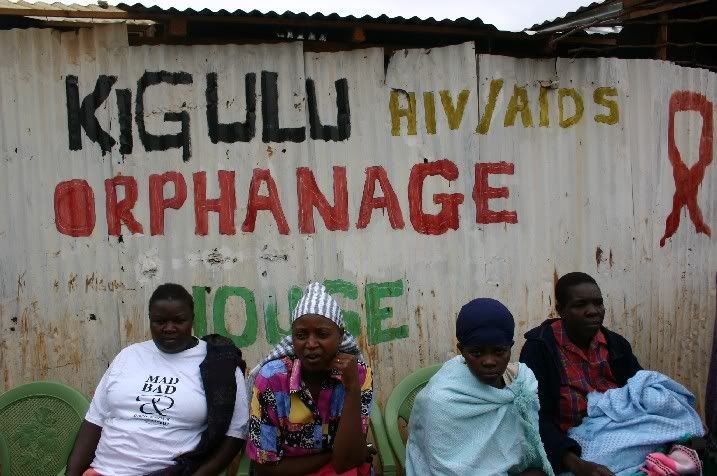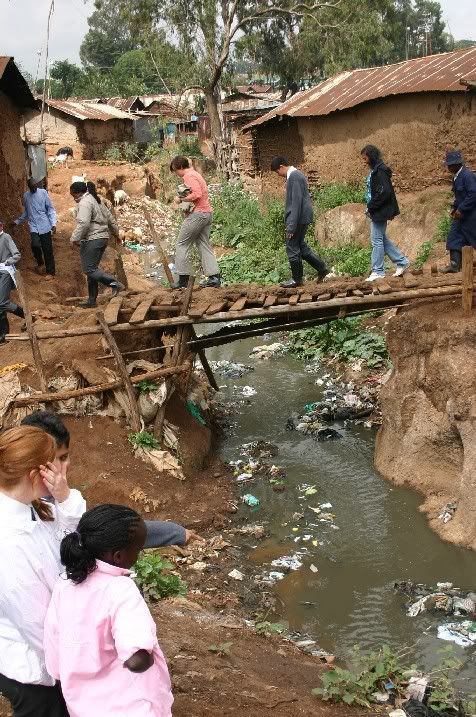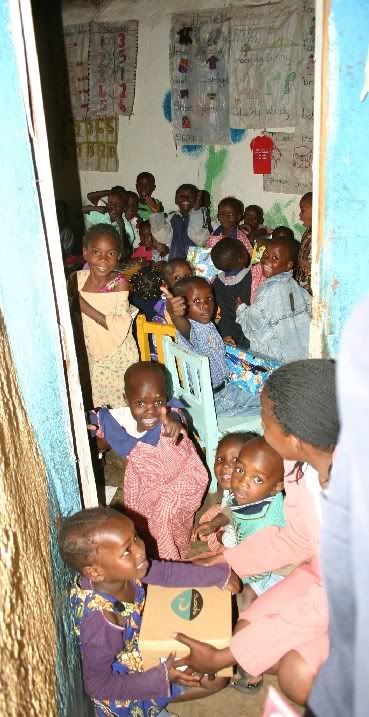Our Group
Some teachers, x 25 ‘year eight’ students (aged 12-13) and a few mums from our school visited the Kigulu shelter for HIV orphans today in order to give Christmas presents to the tiny kids and discuss what form of help the shelter needed most for the future, i.e. how to best pass on the cash that our school parents association have raised. We parked at the local police post and noted the previous president’s smart house (Daniel Arap Moi), that overlooks the slum (he must have witnessed the slum grow from a small village to a gigantic sprawl over his ten years in power and also must have watched the Nairobi dam dry up beneath as a consequence). We also got a ‘tour of Kibera’ by a representative from the shelter, which wound up being a long walk on the uneven compacted rubbish that Kibera sits on for nearly two hours. We went from top to bottom and bottom to top. Walking is what the residents of Kibera do a lot of as they need to get to and from work cheaply and there are no 'public service vehicles' in Kibera (psv are mini buses/taxis). Our ex askari used to walk for three hours to get to our house for the night shift.
We made a large party with two khaki clad armed policemen for protection, all the groundsmen from our school in blue overalls (also for protection), lots of uniformed kids in wellies, three teachers, some mums and a smartly dressed and suited ‘Peter’ our representative from the shelter. All the teachers at the shelter are volunteers.
‘Slum Tourists’
I was slightly concerned about our group looking like ‘slum tourists’ (a bit like the ‘township tours’ you get in South Africa) and apparently I was right to feel sensitive about that, as we were told that the Kibera residents are feeling frustrated by groups of outsiders gazing at them; ‘like monkeys in a zoo’, especially when their situation in the slums never seems to improve. One of the fellow parents said that as part of her work last year she conducted a discussion group in Kibera, asking residents on the ground how they viewed the effectiveness of ‘aid’ to the slum.
‘Nothing ever happens’ they reported. ‘The smart cars drive in and out, the NGO offices are set up by representatives earning high salaries and shortly disappear again. None of the money reaches the people, nothing ever changes for us. We will be voting for a new government in December, as they might change things for us here. We are hoping for change.’
Some teachers, x 25 ‘year eight’ students (aged 12-13) and a few mums from our school visited the Kigulu shelter for HIV orphans today in order to give Christmas presents to the tiny kids and discuss what form of help the shelter needed most for the future, i.e. how to best pass on the cash that our school parents association have raised. We parked at the local police post and noted the previous president’s smart house (Daniel Arap Moi), that overlooks the slum (he must have witnessed the slum grow from a small village to a gigantic sprawl over his ten years in power and also must have watched the Nairobi dam dry up beneath as a consequence). We also got a ‘tour of Kibera’ by a representative from the shelter, which wound up being a long walk on the uneven compacted rubbish that Kibera sits on for nearly two hours. We went from top to bottom and bottom to top. Walking is what the residents of Kibera do a lot of as they need to get to and from work cheaply and there are no 'public service vehicles' in Kibera (psv are mini buses/taxis). Our ex askari used to walk for three hours to get to our house for the night shift.
We made a large party with two khaki clad armed policemen for protection, all the groundsmen from our school in blue overalls (also for protection), lots of uniformed kids in wellies, three teachers, some mums and a smartly dressed and suited ‘Peter’ our representative from the shelter. All the teachers at the shelter are volunteers.
‘Slum Tourists’
I was slightly concerned about our group looking like ‘slum tourists’ (a bit like the ‘township tours’ you get in South Africa) and apparently I was right to feel sensitive about that, as we were told that the Kibera residents are feeling frustrated by groups of outsiders gazing at them; ‘like monkeys in a zoo’, especially when their situation in the slums never seems to improve. One of the fellow parents said that as part of her work last year she conducted a discussion group in Kibera, asking residents on the ground how they viewed the effectiveness of ‘aid’ to the slum.
‘Nothing ever happens’ they reported. ‘The smart cars drive in and out, the NGO offices are set up by representatives earning high salaries and shortly disappear again. None of the money reaches the people, nothing ever changes for us. We will be voting for a new government in December, as they might change things for us here. We are hoping for change.’

The Kigulu Shelter
The first thing that struck me on approaching the corrugated iron shelter was how absolutely tiny it is. In fact, looking round at the mud and stick houses you can see that everyone has to live in tiny spaces. There’s a rather smart (ie comparatively smart) mosque next door with a red painted iron roof and both are approached by a rickety wooden bridge over a rubbish filled open sewer/stream that last year’s leavers from our school constructed after their exams in June. One of our teachers said that it looked like a lot of the pieces of wood from the bridge had already been pilfered – maybe for firewood or materials for construction. That’s one of the hazards of using better quality building materials in Kibera, they can always be put to better use elsewhere! He also said that last year’s school leavers found the work in Kibera slum tough, but they told him it had been the highlight of their end of year ‘wider horizons’ programme (that had also included climbing Mount Kenya and white water rafting).

The ‘shelter’ consisted of two tiny rooms each with twenty five to thirty kids crammed in each. One classroom had no window so was completely dark, in spite of efforts last summer by our students to lighten it up with whitewash. There was a light bulb in evidence but the electricity bill had not been paid so they’d been cut off. My flash photography blinded the kids, but they hooted with laughter and screamed with delight when each picture was taken. There was no outside play area at all, just the makeshift building. Lots of ‘mothers’ were hanging outside the building and they attempted to sell beaded trinkets to us (the beads I gather had been previously donated by our school) – I felt hopeless about not having any cash on me – I’d even taken off my wedding ring to go into the slum so couldn’t even give 100 bob to the ladies (7 pence).

More about walking through Kibera, Donating the presents (the ‘mothers’ wanted presents too) and what might be the future of the slum?

More about walking through Kibera, Donating the presents (the ‘mothers’ wanted presents too) and what might be the future of the slum?
